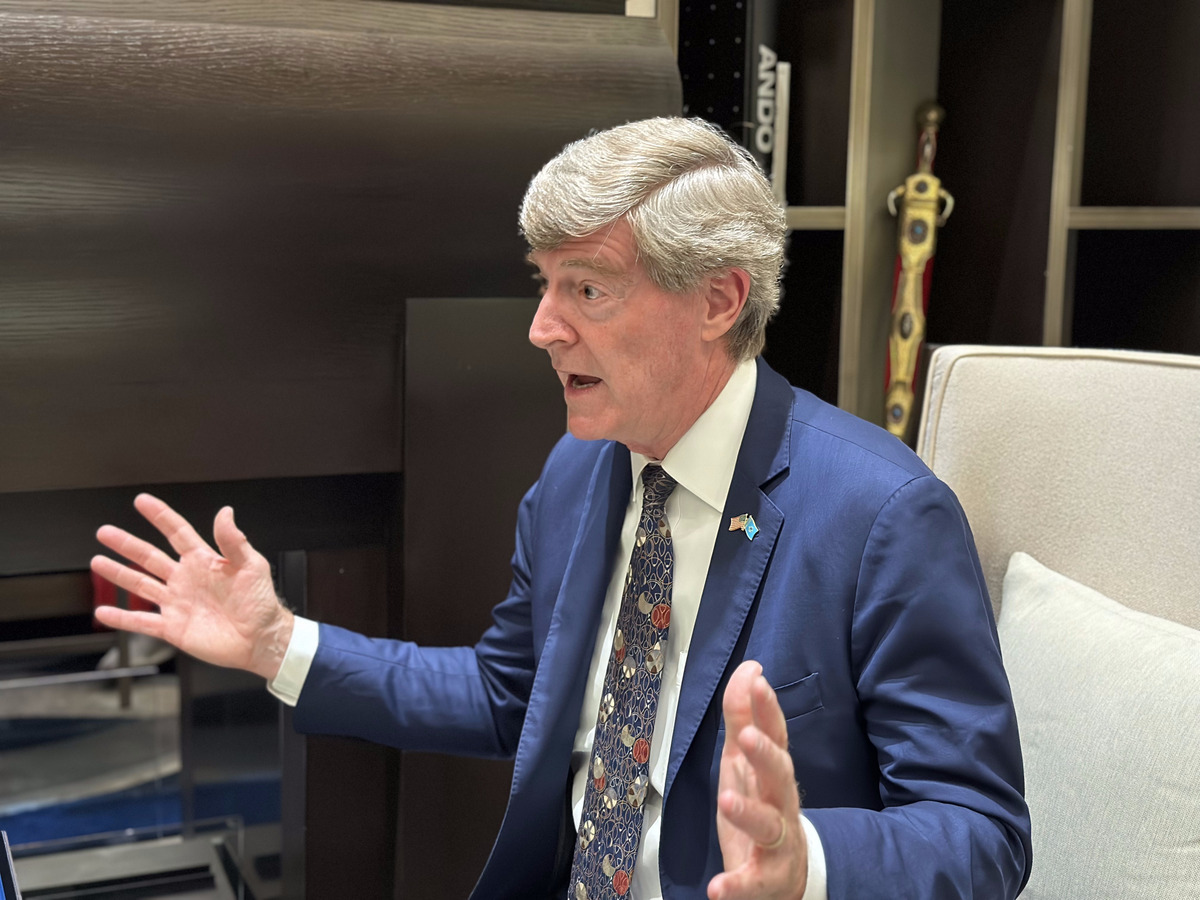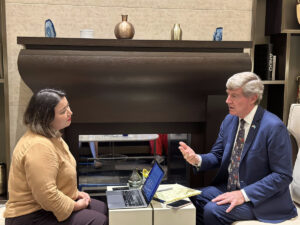ASTANA – While oil and gas have been the backbone of Kazakhstan’s economic growth, they are now moving to a secondary position. Instead, Hugh Hallman, an Honorary Consul of Kazakhstan, said in an interview with The Astana Times that industries such as education, agriculture, and human capital should become primary goals to unlock the country’s full potential.

Hugh Hallman. Photo credit: The Astana Times
Hallman has held numerous distinguished roles throughout his multi-decade career spanning law, education, politics, and business, including serving as Mayor of Tempe, Arizona, United States. He has witnessed firsthand Kazakhstan’s advancement over the last 33 years.
Regarding Kazakhstan’s future, Hallman highlighted the country’s forward-thinking focus.

Hugh Hallman, an Honorary Consul of Kazakhstan, said in an interview with The Astana Times that industries such as education, agriculture, and human capital should become primary goals to unlock the country’s full potential. Photo credit: The Astana Times
According to Hallman, President Kassym-Jomart Tokayev has further developed this vision, showcasing his commitment to advancing the country. He noted that with Tokayev at the helm, Kazakhstan has begun the process of becoming a stable democracy, and the Kazakh citizens have demonstrated that they ultimately desire this transformation.
“President Tokayev has done a spectacular job in the transition from a 30-year presidency to creating a new opportunity for Kazakhstan, which is not an easy thing to do. It is a very difficult position to be in. President Tokayev understands the importance of the rule of law and imposing it across society on everyone, no matter how high or how low you are in that society. That’s crucially important to Kazakhstan’s success,” Hallman said.
Shift towards high-tech and intellectual property investments
Discussing the future trajectory and President Tokayev’s new vision and economic reforms, Hallman noted that industries such as education, agriculture, and human capital could lead to new growth points for the country. He emphasized this because these industries are not hindered by transportation disadvantages. At first glance, this might seem like an impediment to Kazakhstan’s growth since the country is landlocked and lacks seaports. Transportation costs become a significant factor if a country needs to build something that has to be moved. However, industries based on intellectual property open new avenues for growth in Kazakhstan, as they do not require extensive transportation investments.
“Guess what you can move without transportation disadvantages? Intellectual property! You hit send on your computer. You can design aircraft, space vehicles, and a whole lot of things from this intellectual base here. Kazakhstan has that,” he explained.
Agriculture is another gold mine in Kazakhstan, as it has abundant land and water resources. According to Hallman, this sector has the potential to become a cornerstone of a new economic miracle. Kazakhstan boasts 2,000 years of agricultural knowledge, and its universities can further enhance this expertise. By partnering with international institutions, Kazakhstan can rebuild its agricultural intellectual power base, leveraging its natural resources and academic strength.
“There are currently only five global superpowers in agriculture: the U.S., Canada, Brazil, Australia, and New Zealand. There is absolutely no reason that Kazakhstan cannot be number six. I do not mean sixth; I mean one of those six. Why? Because it has the land, the water, and the capacity to achieve it,” he said.
Hallman highlighted that Kazakhstan is often not fully recognized on the world stage despite its enormous potential. He described Kazakhstan as “one of the most dynamic countries on the planet,” noting its difficult position between China and Russia. Despite its challenging neighborhood, Kazakhstan has built a “very stable, very open, dynamic economy.” He acknowledged that while it is not perfect, “neither is the U.S.”
Kazakhstan’s potential: a melting pot of dynamic solutions
Hallman believes Kazakhstan is poised for exponential growth. Reflecting on Kazakhstan’s history since gaining independence in 1991, he noted that the country started from a difficult position following the collapse of the Soviet Union with shortages of oil, natural gas, and food. Yet, the people of Kazakhstan came together as a historic, multi-ethnic nation. Hallman emphasized “few people understand that Kazakhstan is one of the most ethnically diverse countries on the planet.” He drew a parallel to the U.S., stating that both countries’ diverse perspectives enable them to create dynamic solutions.
“What Kazakhstan has is a people. Think about it. You had the potential for race wars here because you have such ethnic diversity. It did not happen. People all started working together. They were all working together to create this result,” he said.
He noted that Kazakh citizens share similarities with Americans. Hallman observed that historically, Kazakhs were, in his words, “civil libertarians.”
“My culture for 2,000 years has been, ‘I take care of myself and my family and my family and I are a unit.’ We create some socialization. I mean that in terms of being socialist because you have to share this, but it is in a limited context. Unlike Chinese culture, ‘We’re all one big blob, and the blob matters more than any individual.’ In Kazakhstan, human beings matter. That is an unusual cultural ethic,” he said.
“I can feel the vibrations. Yes, we may not be on the same note, but we are harmonic,” he added.
According to Hallman, Kazakhstan boasts a robust international team dedicated to enhancing its trading position on the global stage.
“Kazakhstan deserves permanent normalized trade relations,” he emphasized, underscoring the nation’s ongoing challenges with the Jackson-Vanik Amendment. Reflecting on Kazakhstan’s diplomatic efforts, Hallman praised the expertise of its embassy team in the U.S., particularly Ambassador Yerzhan Ashikbayev in Washington, D.C., whom he described as “one of the finest and most skilled foreign officers” he has encountered in his extensive career.


